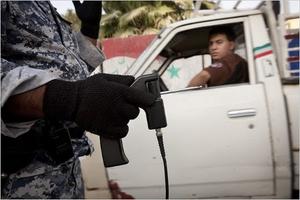Annals of outrageU.K. police raids companies selling explosives "divining rods"
A British company made millions of dollars selling hand-held explosives “divining rods” to Iraqi security forces; despite scientific evidence that the device was a hoax., the Iraqi army and police kept using millions in U.S. aid dollars to buy the worthless gimmick and equip check-point personnel with it; in February the British government banned the production and sale of the device, and last week the police raided three companies for exporting fake bomb detectors

The "magic wand" explosive detector in use by Iraqi security forces // Source: blogspot.com
Last November we reported that the Iraqi government had spent tens of millions of U.S. aid dollars to buy thousands of “magic wands” which were supposed to detect explosives at checkpoints. One American officer said the device works “on the same principle as a Ouija board.” Another officer said that to believe the claims of the British company which was selling the device, and of the Iraqi authorities that swore by it, “would be laughable” — except that people were dying as a result. “[The company and Iraqi government have] crossed an insupportable line into moral depravity” the American officer said (“Iraqis use ‘magic wand’ at checkpoints to detect explosives; U.S. officer: this is ‘laughable,’” 5 November 2009 HSNW; and “Bomb-sniffing dogs to replace worthless magic wands in Iraq,” 4 February 2010 HSNW).
Matthew Harwood offers an update of this disturbing story. Five locations linked to three British companies were raided by London police on Tuesday for suspicion of exporting fake bomb detectors banned earlier this year by the British government and blamed for hundreds of deaths in Iraq.
“Officers from City of London Police’s Overseas Anti-Corruption Unit (OACU) carried out five search warrants on three homes and two business premises on Tuesday,” reports the BBC. “The unit is investigating whether the devices’ abilities have been fraudulently misrepresented, and whether sales overseas are linked to bribes.” The locations raided were linked to Grosvenor Scientific, Scandec Inc. and Global Technical. Police, according to the Financial Times, confiscated cash and hundreds of the hand-held devices and their component parts.
Both the British and U.S. governments have determined that the bomb detectors, known as the ADE-651, are nothing more than a hoax — and a cruel one at that considering they are used to stop explosives from entering cities like Baghdad.
“The examination resulted in a determination that there was no possible means by which the ADE651 could detect explosives and therefore was determined to be totally ineffective and fraudulent,” Maj. Joe Scrocca, a U.S. military spokesman in Baghdad, told the AP in January.
The Independent’s Baghdad correspondent Patrick Cockburn explained how the pseudo-science behind these “sonars,” as Iraqi checkpoint guards call them, allow the devices to detect explosives. “It is meant to work on the same principle as water-divining rods and has no power source, relying instead on the static electricity generated by the movement of the person holding it,” he reports.
In the field, Iraqi soldiers and policemen armed with the ADE-651 walk the line of cars at checkpoints, pointing them at vehicles. If the wand attached to the handset vibrates, then that car should be searched for explosives. Explosives are rarely, if ever, found. Kim Sengupta, the Independent’s defense correspondent, reports researchers have found random searches are more effective at finding explosives than the hand-held “divining rods.”
Despite numerous experiments exposing the detectors as fraud and calls for an investigation by Iraqi Prime Minister Nouri al-Maliki, Cockburn reports the ADE-651 is still used by guards at checkpoints. Last week, Cockburn reported he had two run-ins with guards still wielding the devices.
“[E]arlier this week I was prevented from entering one heavily guarded area with my car because the wand had twitched. I continued on foot but the police insisted that the car be parked a hundred yards away from them in case it really did contain a bomb,” he writes. “Yesterday, the same car was stopped on Jadriyah bridge over the Tigris and held for 45 minutes for the same reason, until a police lieutenant suggested we cross the river by another bridge where a similar inspection by a bomb-detector produced no results.”
Harwood writes that Cockburn concludes that there are two deleterious consequences of the use of the ADE-651 at Iraqi checkpoints: It allows terrorist car bombs in, while creating time-devouring traffic jams that harm ordinary Iraqis and try their patience.
